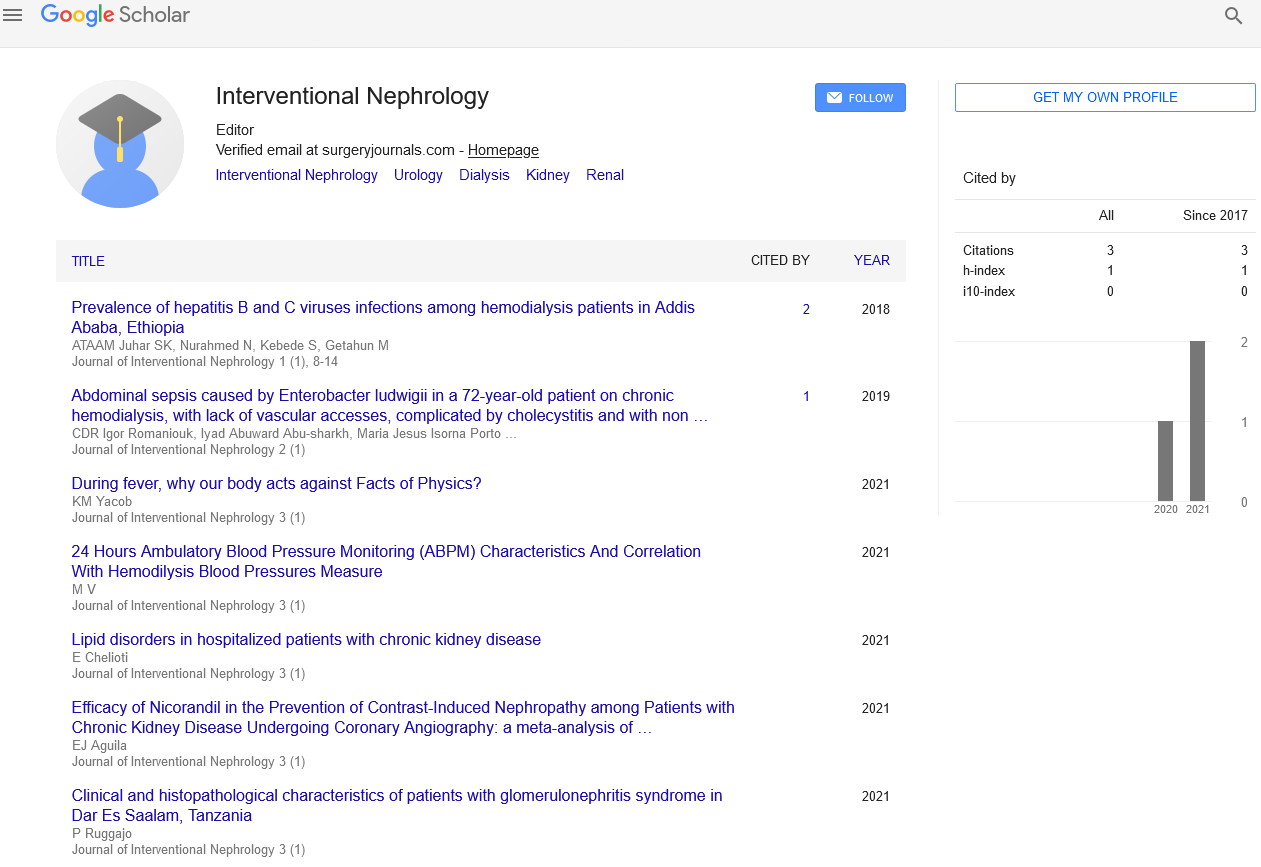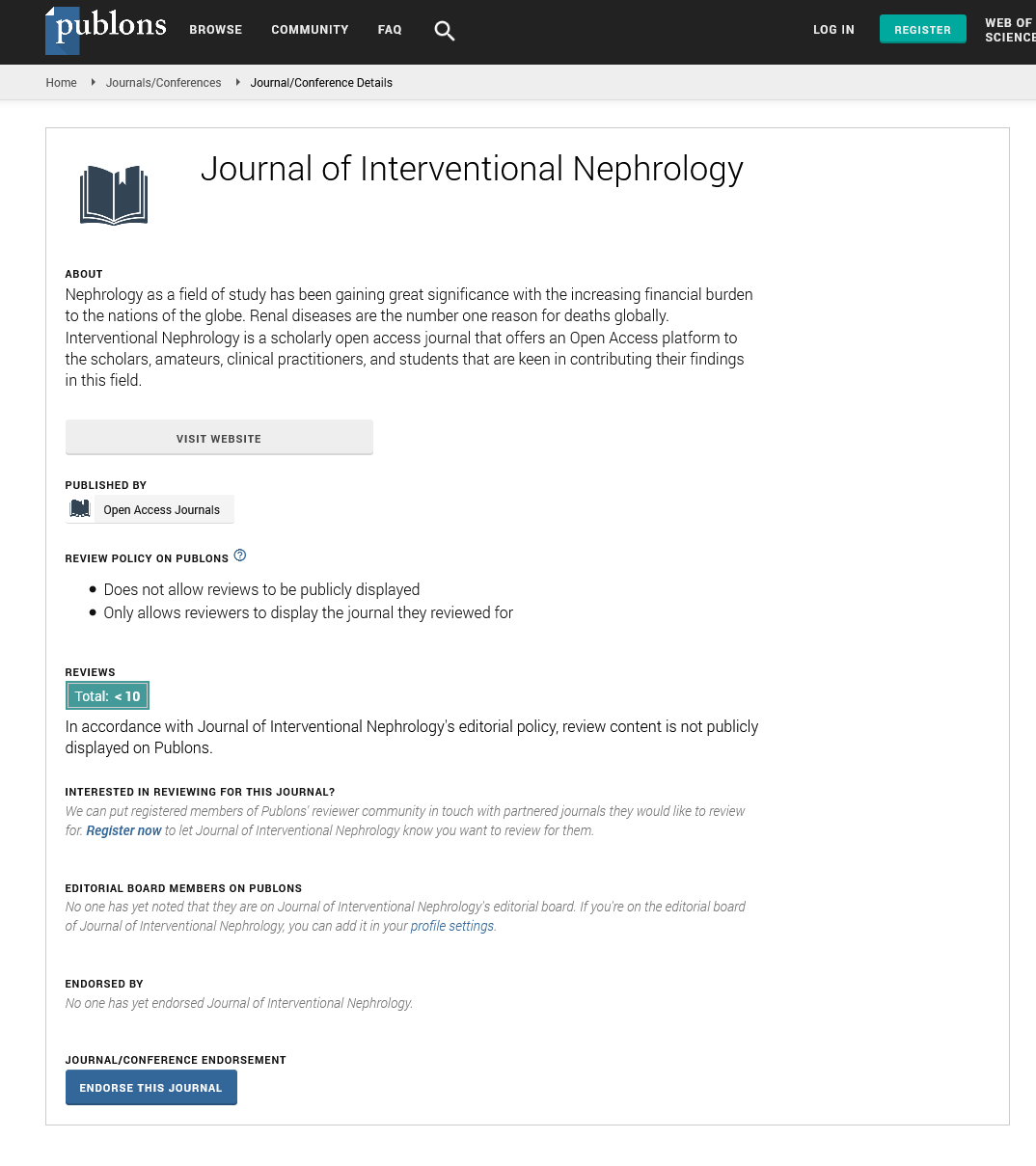Perspective - Journal of Interventional Nephrology (2024) Volume 7, Issue 1
Diabetic Kidney Disease: Navigating the Intersection of Diabetes and Renal Health
- Corresponding Author:
- Anna Rohrer
Department of Nephrology, Emory University, China
E-mail: Annarohrer23vd@gmail.com
Received: 22-Jan-2024, Manuscript No. OAIN-24-125670; Editor assigned: 24-Jan-2024, PreQC No. OAIN-24-125670 (PQ); Reviewed: 07-Feb-2024, QC No. OAIN-24-125670; Revised: 14-Feb-2024, Manuscript No. OAIN-24-125670 (R); Published: 23-Feb-2024, DOI: 10.47532/oain.2024.7(1).218-220
Abstract
Diabetic Kidney Disease (DKD), a prevalent and serious complication of diabetes, poses a significant health challenge globally. This comprehensive article delves into the intricate relationship between diabetes and kidney health, exploring the pathophysiology of DKD, risk factors, clinical manifestations, diagnostic strategies, treatment modalities, and the imperative need for early intervention and preventive measures in managing this complex interplay of metabolic and renal disorders.
Keywords
Microalbuminuria • Glomerular hyperfiltration • Anemia • Kidney biopsy • Proteinuria
Introduction
Unraveling the connection
Complex interplay: DKD emerges as a consequence of longstanding diabetes affecting the kidneys.
Global prevalence: A major contributor to End-Stage Renal Disease (ESRD) worldwide.
Diabetes and renal health
Insulin resistance: A hallmark of diabetes contributing to systemic complications.
Renal microvascular changes: Altered blood flow impacting kidney function.
Impact on public health
Economic burden: Healthcare costs associated with DKD management.
Preventive strategies: The pivotal role of awareness and early intervention in mitigating DKD prevalence.
Pathophysiology of diabetic kidney disease
Hyperglycemia and glomerular damage: 1) Glucose toxicity: Persistent high blood sugar levels leading to glomerular dysfunction. 2) Proteinuria: An early sign of glomerular damage, indicating increased permeability.
Renal inflammation and fibrosis
Inflammatory pathways: Activation of cytokines and immune responses.
Extracellular matrix accumulation: Progressive scarring impairing kidney function.
Hemodynamic changes
Renal blood flow alterations: Dysregulation contributing to hypertension.
Glomerular hyperfiltration: An early compensatory response that becomes maladaptive over time.
Risk factors and predictors
Duration and control of diabetes: 1) Long-term exposure: The risk of DKD increases with the duration of diabetes. 2) Glycemic control: Maintaining optimal blood sugar levels to reduce the risk of complications.
Blood pressure management
Hypertension: A common comorbidity accelerating kidney damage.
Target blood pressure: Individualized goals for diabetic individuals to prevent DKD progression.
Genetic and environmental factors
Genetic predisposition: Familial tendencies influencing DKD susceptibility.
Lifestyle influences: Diet, physical activity, and environmental factors impacting renal health.
Clinical manifestations of diabetic kidney disease
Silent progression: 1) Asymptomatic early stages: DKD may progress without noticeable symptoms. 2) Microalbuminuria: An early indicator of renal involvement often detected through urine tests.
Advanced stages: recognizable symptoms
Proteinuria and hematuria: Indicative of glomerular damage and impaired filtration.
Edema and fluid retention: Resulting from impaired salt and water balance.
Decline in GFR: Gradual loss of kidney function leading to complications.
Systemic implications
Cardiovascular complications: Increased risk of heart disease and stroke.
Anemia: Resulting from decreased erythropoietin production by the kidneys.
Diagnostic approaches and screening strategies
Urine and blood tests: 1) Urine albumin-to-creatinine ratio: Detecting microalbuminuria and proteinuria. 2) Serum creatinine and eGFR: Assessing kidney function and filtration rate. 3) Blood glucose monitoring: Regular checks to maintain glycemic control.
Imaging studies
Ultrasound: Visualizing kidney size, structure, and abnormalities.
Kidney biopsy: Invasive but definitive in certain cases for precise diagnosis.
Importance of early detection
Annual screening recommendations: Especially for individuals with diabetes.
Educational initiatives: Raising awareness about the significance of regular check-ups.
Description
Management and treatment modalities
Glycemic control: 1) Insulin therapy and oral medications: Managing blood sugar levels effectively. 2) Lifestyle modifications: Diet and exercise to support glycemic control.
Blood pressure management
Angiotensin-Converting Enzyme (ACE) Inhibitors and Angiotensin II Receptor Blockers (ARBs): Renoprotective agents addressing hypertension.
Individualized targets: Tailoring blood pressure goals based on patient characteristics.
Medications to preserve kidney function
SGLT2 inhibitors: Emerging as a class of drugs with renal protective effects.
Erythropoiesis-stimulating agents: Addressing anemia in advanced stages of DKD.
Renal replacement therapies
Dialysis: Hemodialysis and peritoneal dialysis for advanced stages.
Kidney transplantation: Surgical replacement of a damaged kidney with a healthy donor kidney.
Challenges in diabetic kidney disease management
Patient adherence
Medication compliance: Ensuring individuals adhere to prescribed regimens.
Lifestyle modifications: The challenge of sustaining long-term behavioral changes.
Access to advanced therapies
Cost and availability: Disparities in access to newer medications and treatment modalities.
Healthcare infrastructure: Challenges in delivering specialized care in certain regions.
Psychosocial impact
Quality of life: Addressing the emotional toll of living with a chronic condition.
Supportive care: Integrating mental health services into DKD management.
Research and innovations in diabetic kidney disease care
Targeted therapies
Anti-inflammatory agents: Addressing inflammation as a therapeutic target.
Novel drug developments: Investigating medications with specific renoprotective effects.
Precision medicine approaches
Genomic studies: Identifying genetic factors influencing DKD susceptibility and progression.
Personalized treatment plans: Tailoring interventions based on individual patient profiles.
Telehealth and remote monitoring
Remote patient management: Utilizing technology for continuous monitoring.
Digital health platforms: Facilitating patient engagement and self-management.
Patient-centric care and quality of life
Multidisciplinary teams: 1) Collaboration among specialists: Nephrologists, endocrinologists, dietitians, and mental health professionals. 2) Patient education: Empowering individuals to actively participate in their care.
Patient support and advocacy
Community initiatives: Support groups and educational programs for individuals with DKD.
Advocacy organizations: Fostering awareness, research, and policy initiatives.
Ethical considerations in DKD care
Informed consent: Ensuring patients actively participate in treatment decisions.
End-of-life planning: Discussing preferences and goals with regard to advanced care.
Conclusion
Diabetic kidney disease, at the nexus of diabetes and renal health, necessitates a multifaceted approach involving early detection, effective management, and ongoing research initiatives. As the landscape of DKD care evolves, a collective commitment to preventive strategies, patient-centered care, and equitable access to advanced therapies will shape a future where the impact of this intricate interplay is minimized. Through continuous research, awareness, and global collaboration, the medical community strives to navigate the complexities of diabetic kidney disease, offering hope and improved outcomes for individuals affected by this challenging intersection of metabolic and renal disorders.


